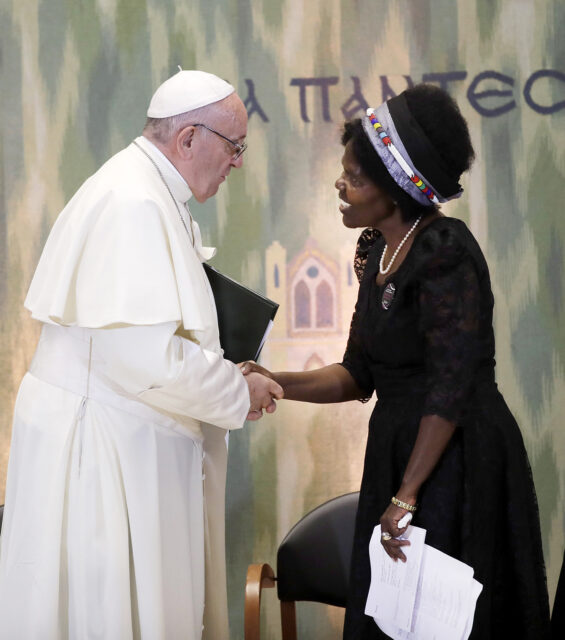NAIROBI, Kenya (RNS) — Agnes Abuom, a global ecumenical leader and peacemaker, died on Wednesday at the age of 73 while undergoing treatment in a hospital in Nairobi.
Sources close to her said she had succumbed after a short illness. Church leaders, ecumenical groups and ordinary Christians in Kenya, Africa and the rest of the world, mourned her as a passionate ecumenist, tireless peacemaker and a fighter for social justice.
“I share deep sadness that Dr. Agnes Abuom passed on this evening at the Coptic hospital in Nairobi,” said Rev. Fidon Mwombeki, a Tanzanian Lutheran pastor and general secretary of the All Africa Conference of Churches, on Wednesday. “We thank God for Agnes’ life which has been rich and well lived. Her ecumenical ministry spanning decades is iconic. May her soul rest in eternal peace.”
A lay canon in the Anglican Church of Kenya, Abuom long served as an official of the Central Committee of the World Council of Churches, the global fellowship of Christian churches based in Geneva, Switzerland, most recently as the committee’s moderator from 2013 to 2022.
On her election in 2013, she became the first woman and first African to hold the position of moderator for the WCC.
“She was a woman of humble spirit, great compassion and steadfast faith,” said the Rev. Jerry Pillay, a South African who is the general secretary of the World Council of Churches, in a tribute posted on the organization’s website. “Though small in frame yet she possessed the energy, strength and vision for leadership far beyond the reach of many people her age.”
She played a significant role in the search for peace in Sudan and South Sudan after the latter gained independence from Sudan in 2011, becoming the world’s youngest nation.
“In Sudan and South Sudan, Agnes will always be remembered as one who faithfully accompanied the Church for so many years in its quest for justice and peace in those two troubled countries,” said John Ashworth, a retired Roman Catholic Mill Hill missionary priest, who has worked for 40 years in both Sudan and South Sudan. “I count it a privilege to have known her, worked with her and learned from her.”
Born in 1949 in Nandi, a lush green highland area on the edge of the Great Rift Valley in Southwestern Kenya, her mother was a Protestant Christian and her father a Roman Catholic.
Abuom began her education at a local mission school and later in an Anglican high school in Nairobi. At the University of Nairobi, where she studied education, she got so deeply involved with student leadership and politics that she did not finish her degree. Threatened with arrest following a political controversy, she fled to Sweden in 1976. While there, she learned Swedish and completed her studies.
While still a student in Nairobi, she first worked with the World Council of Churches assembly in Nairobi, and would later work for the council on youth education before returning to Uppsala University in Sweden to earn a doctorate. She later worked for the council on refugee issues and spent two years as a tutor in Zimbabwe.
When she returned to Kenya in 1989, President Daniel arap Moi imprisoned her at Nyayo House, a skyscraper in Nairobi, where the government is said to have tortured prisoners.
“You fight for something that you are true to and that comes with its share of struggle,” Abuom told Kenya’s Business Daily in 2021. “The issue was Moi was using people in the church as agents, accusing others falsely. For a while, I was angry at Moi and his henchmen, yes, but I was angrier at those of us who proclaimed to be Christians but were party to subjecting people to suffering for the wrong reasons.”
After her release, besides her roles at the WCC, she represented the Anglican Church of Kenya in WCC governing bodies and served on the All Africa Conference of Churches Advisory Committee on Peace, Healing and Reconciliation and was a co-president of Religions for Peace.
In 1997, Abuom founded TAABCO Research and Development Consultants, which advises development organizations on poverty issues, and a regional church trust known as Building Eastern Africa Community Network (BEACON).
“A remarkable woman of dedication and passion, Abuom has left an indelible mark in the world. An advocate for the fidelity of the gospel and social justice, her legacy will inspire generations,” said the Rev. Fred Nyabera, director of the Interfaith Initiative to End Child Poverty at Arigatou International, for which she was a board member.





